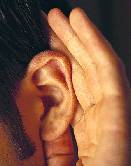In many cases where the outer ear (pinna) has been lost, the external auditory canal is usually intact, and the remainder of the person's hearing system should function normally. "In these patients, the physician must strive not only to correct the aesthetic defect caused by the missing pinna, but also to correct the hearing loss caused by its absence," wrote Dr. William E. Walsh, of Northwestern's Feinberg School of Medicine, and colleagues.
The researchers analyzed eight different silicone rubber prosthetic ears. In the first part of the study, they attached a microphone at the entrance to a simulated ear canal on a life-sized plastic foam head. The microphone measured sound pressure levels both with and without the ear prostheses attached to the head as it was rotated 360 degrees.
On average, the prostheses improved sound pickup by 8.1 decibels (normal conversation is about 60 decibels) when the frequency of sound was 4.6 kilohertz, and by 9.7 decibels when the frequency was 11.5 kilohertz.
The second part of the study included 11 young adults with normal hearing who took part in a speech test involving simulation of hearing problems associated with the loss of an outer ear. In this test, the prosthetic ears improved speech recognition.
The findings were published in the September/October issue of the journal Archives of Facial Plastic Surgery.
"Auricular prostheses provide an acoustic gain at certain head positions and frequencies, and this acoustic gain is clinically relevant, because it benefits speech recognition in noise," the study authors wrote.
"In some individuals, auricular prostheses not only effectively restore aesthetics, but also may improve hearing. To verify the results of the present experiments, the main outcome measures described in this study will be used to obtain future measurements from individuals who wear auricular prostheses."
More information
The American Speech-Language-Hearing Association has more about hearing loss  .
.
SOURCE: JAMA/Archives journals, news release, Sept. 15, 2008
Copyright © 2008 ScoutNews, LLC
 . All rights reserved.
. All rights reserved.HealthDayNews articles are derived from various sources and do not reflect federal policy.
omhrc.gov does not endorse opinions, products, or services that may appear in news stories.


